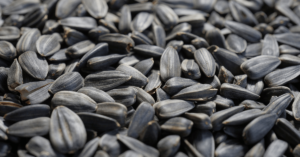
The Agricultural Ministers of Ukraine and Bulgaria, Mykola Solsky and Kyrylo Vatev, discussed technical issues of Ukrainian agricultural exports to Bulgaria during online talks on Friday.
“The Bulgarian government considers the action plan of Ukraine submitted to the European Commission on the supply of agricultural products acceptable. Bulgaria has its own proposals to the mechanism of licensing certain types of agricultural products proposed by Ukraine. In particular, this concerns sunflower, while Bulgaria has no objections to the export of the other three crops,” the press service of the Ministry of Agrarian Policy and Food of Ukraine reported.
The Bulgarian Ministry of Agriculture and Farming clarified that Vatev familiarized Solsky with the memorandum signed between the Bulgarian government and the initiative committee of farmers, which provides for a ban on the import of sunflower from Ukraine until the end of November.
After this period, a licensing regime for the export of sunflower, wheat, corn and rapeseed will be in place, according to the plan agreed between Ukraine and the European Commission.
Vatev also spoke about the concerns of Bulgarian farmers and processors regarding the imports of refined and unrefined sunflower oil, milk powder, honey, sugar and frozen raspberries from Ukraine.
“It is very important to discuss all the problems affecting our agricultural producers and to look for solutions together,” the Bulgarian minister emphasized.
The ministers agreed to agree on the technical details of the procedure for exporting agricultural products to Bulgaria and discuss their results at the next meeting in the first half of October, the press service of the Ministry of Agrarian Policy reported.
The Bulgarian Ministry of Agriculture added that regular data exchange between the two agricultural agencies will become weekly. It will include the exchange of information on exports and imports of certain agricultural products.

The Party “Democratic Bulgaria” (PP-DB) proposes to transfer to Ukraine about 100 armored personnel carriers from the warehouses of the Bulgarian Interior Ministry, Euronews Bulgaria reports citing MP Ivaylo Mirchev.
“The APCs, produced in the 1960s and 1970s, were purchased by the then “Internal Troops” (today’s gendarmerie) but were not used and are no longer needed. Bulgaria pays a lot of money for storage and maintenance of this equipment,” the newspaper quoted the MP as saying.
According to him, the initiative involves Bulgarian Prime Minister Nikolai Denkov, Defense Minister Todor Tagarev, Interior Minister Ivan Demerdzhiev, Chairman of the Parliamentary Committee on Defense Hristo Gadjev, as well as the leader of the party GERB (Citizens for European Development of Bulgaria) Boyko Borisov.
It is noted that the draft decision of the National Assembly will be presented on Thursday and supported by the PP-DB, GERB and DPS (Movement for Rights and Freedoms) parties.
Mirchev hopes that Bulgaria will still be able to take advantage of the promised US military aid in exchange for providing Ukraine with Soviet-era equipment.
In addition, he noted that the sale of nuclear equipment to Ukraine “is also a very favorable deal, because in this way we (Bulgaria – IF-U) will not only help the Ukrainians to complete their NPPs and return a significant part of our investments”.

A memorandum of understanding between the Ukrainian and Bulgarian energy ministries on cooperation in the energy sector was signed in the presence of Zelensky and Bulgarian Prime Minister Nikolo Denkov during an official visit of Ukrainian President Volodymyr Zelensky to Bulgaria.
According to the press service of the Ukrainian head of state, the document was signed by Ukrainian Energy Minister Herman Galushchenko and Bulgarian Energy Minister Rumen Radev.
“The memorandum is aimed at creating framework conditions for deepening cooperation in the energy sector of Ukraine and Bulgaria based on the principle of mutual benefit and taking into account common interests and goals of both countries,” the statement said.
Ukraine and Bulgaria undertook to provide affordable energy, as well as to support industrial and regional development, security and prosperity of their peoples, expand cooperation and a shared commitment to protect the environment and mitigate climate change and reduce carbon emissions.
It was noted that taking into account Ukraine’s status as a candidate for EU membership and Bulgaria’s obligations as a EU member state, the sides agreed to intensify further mutually beneficial cooperation in the field of nuclear energy, green energy, hydrogen, as well as energy storage systems and smart grids.
Sharing knowledge and experience to protect energy infrastructure from physical, electromagnetic, and cyber threats is a priority in the cooperation.
As reported, Bulgarian parliamentarians by a majority vote delegated the country’s Energy Minister to negotiate with his Ukrainian counterpart on the possibility of selling equipment intended for Belene NPP to Kiev, Bulgarian National Radio (BNR) reported Thursday.
The decision was supported by 135 deputies, while 57 opposed.
Earlier, BNR reported that Ukraine had expressed interest in purchasing the reactors intended for Belene NPP.
Bulgaria abandoned the project in 2012.

A representative of the Citizens for Democratic Development of Bulgaria-Union of Democratic Forces (GERB-UDS) coalition, Maria Gabriel, on Monday returned to President Rumen Radev a mandate to form a government, Bulgarian National Radio reported.
“The folder I am returning is empty because I will not allow it to contain the names of people who got there not through open and clear negotiations, but through backroom deals,” she said in a meeting with Radev.
Shortly before her meeting with the president, Gabrielle briefed the Bulgarian National Assembly. It was also attended by Nikolai Denkov of the Continuing Change-Democratic Bulgaria coalition.
According to Gabrielle, the two coalitions have worked out a formula based on reason rather than emotion in the last 48 hours. The two coalitions, in particular, came to an agreement to run the government on a rotating basis. The plan was for Denkov to lead the cabinet for the first nine months, with Gabrielle as foreign minister, and for the next nine months they would swap portfolios.
According to observers, the rotational management of the government, among other things, served as a stumbling block to the successful formation of the cabinet.

Bulgarian authorities have revised the entry conditions for foreign citizens, now travelers with unopened Schengen single and multiple entry visas, as well as with national visas of Romania, Croatia and Cyprus can not enter the country, writes the government newsletter of the republic.
“The Republic of Bulgaria will consider the following documents issued by the member states of the Schengen Agreement: a single entry visa valid for two or more entries after it has been used once to enter a Schengen country, as well as a visa with limited territorial validity for two or more visits after a single entry into the Schengen area,” the document says.
As the newspaper notes, similar requirements will be imposed on holders of national short-term and long-term visas of Cyprus or Romania. After visiting these countries entry into Bulgaria is possible for a period of not more than 90 days within 180 days.
The national short-term and long-term visas and residence permits issued by Croatian authorities until December 31, 2022 are recognized as equivalent to the Bulgarian national visas for transit and residence.

The agrarian ministries of Ukraine and Bulgaria are starting to develop a declaration on the mechanisms of influence in case of possible market shocks, including sharp price changes, in bilateral trade of sunflower oil, the press service of the Bulgarian Ministry of Agriculture said.
“The declaration is expected to signal the willingness of both sides to act together to prevent future market anomalies,” the Bulgarian agriculture ministry said in a statement following talks Friday in Sofia between Bulgarian Agriculture Minister Yavor Gechev and Ukrainian Agropolitics Minister Nikolai Solsky.
The sides discussed an emergency protective measure of the European Commission to temporarily ban imports from Ukraine of four crops – wheat, corn, canola and sunflower – in Bulgaria, Poland, Romania, Slovakia and Hungary.
Gechev informed the participants of the negotiations about the Bulgarian government’s decision to lift the national ban on imports from Ukraine of a number of agricultural products and said the Bulgarian side will closely monitor the market both in terms of sunflower oil and other agricultural products.
“Bulgaria and Ukraine can work together to find long-term solutions for accelerated transit of agricultural goods to third countries and propose them to the European Commission,” the Bulgarian minister said.
He said that Bulgaria’s efforts are currently focused on the development of logistical systems through which solidarity corridors will function and fulfill the function for which they were created.
“Together we can face the challenges posed by the current situation and, in this way, solve them more quickly and efficiently,” Gechev stressed.
In turn, Nikolai Solski expressed the hope that the dialogue between the agrarian departments of the countries will continue. He assured his Bulgarian colleague that Ukraine was ready to jointly solve any arising issues in the future.
For its part, the Ukrainian Ministry of Agrarian Policy said after the talks that Bulgaria was ready to import all agricultural products from Ukraine, except for the four crops mentioned above.